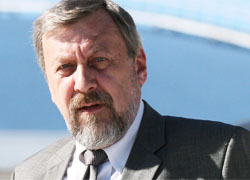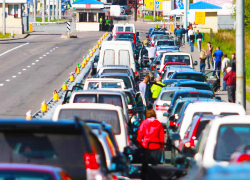 A hardline policy towards the dictator and visa-free travels to the EU for ordinary Belarusians are needed.
A hardline policy towards the dictator and visa-free travels to the EU for ordinary Belarusians are needed.Former Belarusian presidential candidate Andrei Sannikov said during an international conference in Vilnius on Tuesday that he would call for sanctions against the Belarusian government because "believe me, they work."
"Lukashenka understands only the language of sanctions," Mr. Sannikov, a former political prisoner who was granted political asylum in Britain in 2012, said during the conference, which focuses on possible strategies for the EU's engagement with Belarus. "It is necessary to take a tough line on the dictator and his regime while involving the Belarusian public in a dialogue." Mr. Sannikov called on the European Union to abolish the visa requirement for Belarusians. This measure would do much more to increase pro-European sentiments in Belarus than any statements, he said.
According to Mr. Sannikov, Europe failed to use its "window of opportunity" following the 2010 presidential election in Minsk. "The opposition was winning the election and I was the leading candidate," he said. "It's unclear why Europe didn't ask tough questions about the legitimacy of Lukashenka."
Mr. Sannikov warned against "playing liberalization" with Belarusian authorities. "The situation in Belarus deteriorates after each such attempt," he said. "If Europe is ready to assume responsibility, indeed, personal responsibility, for further repression and murders in Belarus, let it continue its policy of engaging the regime in a dialogue."
Yury Hubarevich, deputy chairman of the Movement for Freedom, said that in recent years, Mr. Lukashenka had been balancing between the EU and Russia, using a "pendulum policy" to good effect. "However, he is running out of room for maneuver," he said. "The Eurasian Economic Union Agreement may be signed in two years, which would be the point of no return for us." Mr. Hubarevich said that Europe's policy of rewarding "positive steps" by Belarus with preferences was not working. "Lukashenka's policy regarding the EU and Russia is very simple—get as much money as possible without making any decisions that may affect the stability of his government," he said. Mr. Hubarevich said that Europe should try to influence Mr. Lukashenka through the Belarusian public. "Lukashenka is forced to take public opinion into account," he said. "On several occasions, he backed down in the face of public indignation." For example, he had to order the reduction of motor fuel prices after their drastic increase and then withdrew his own proposal to impose a $100 exit duty on Belarusians traveling abroad for shopping, he said. Polls indicate that about 40 percent of the Belarusians are in favor of rapprochement with Europe, Mr. Hubarevich said, adding that Europe should use this lever to influence the regime. Anatol Lyabedzka, chairman of the United Civic Party, said that the EU should push for the release and exoneration of all political prisoners in Belarus and also demand that the government hold free and fair elections. If the government releases the political prisoners without exonerating them, the root cause of politically motivated persecution will remain, and new political prisoners will eventually appear, Mr. Lyabedzka said.
Kilde : http://charter97.org/en/news/2013/10/29/78690/


